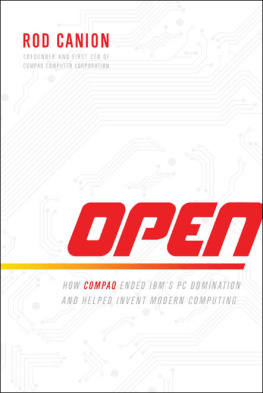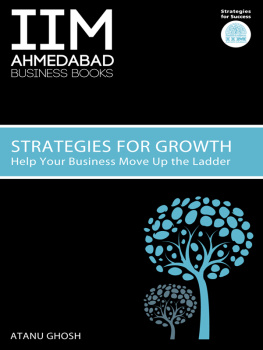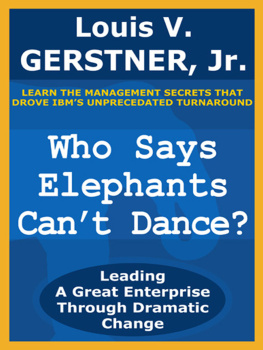Praise for OPEN
An upstart company in Texas, with cows grazing outside its windows, bets its future on open standards, only to find itself battling the worlds most powerful technology company for control of the personal computer industry. Rod Canion reveals the back-room battles, secret alliances, and bet-the-company decisions he made as CEO of Compaq, which he guided from start-up to Fortune 500 in less than four years. Canions process for making executive decisions will be of interest to managers in any competitive industry.
PETER H. LEWIS,
former senior writer and technology columnist, The New York Times
___________
Compaqs early business decisions changed the course of personal computing. This is a detailed, inside look at those high-risk, high-reward calls by the executive who made them and holds important lessons for competitive strategy.
RICHARD SHAFFER,
former technology columnist for The Wall Street Journal,
Forbes, and Fortune
Few technical arcana put laymen to sleep faster than a discussion of industry standards, even though winning and losing in technical business often depend on them. Canions description of the human side of cobbling together whats needed to create one of these standards is correctand a good read, too.
ANDY GROVE,
former CEO of Intel
___________
David was a lot smaller than Goliath, but his relative size paled in comparison to that of start-up Compaq Computer when it set out in 1982 to overtake personal computer giant IBM. Yet remarkably, just a decade later, Compaq had successfully toppled IBM as the worlds largest PC company. In this fast-paced recounting of how the inconceivable became the actual, Compaq cofounder Rod Canion tells how daunting hurdles were overcome and opportunities seized. The press, the analysts, the Wall Streeters had said at the beginning it couldnt be done. Rod and his team did it. Open will take you along on this exhilarating ride through technology, innovation, and unprecedented industrial growth.
BEN ROSEN,
former Chairman of Compaq
___________
Open is a fascinating insider account of how the once IBM-dominated proprietary computer industry was transformed into one of open standards in the late 1980s and early 1990s as upstart startup Compaq, with a little help from Intel and Microsoft, decisively defeated IBM on Big Blues own turf. IBMs crushing defeat in the PC market set a crucial precedent for the replacement of traditional proprietary architectures with open standards for systems, networking, and software platforms across the information industry.
It is always tempting, looking back at history, to assume the inevitability of whatever actually happened. Canions inside account the founding of Compaq, its success, and its crucial role in the ultimate victory over IBM in defining an industry standard PC architecture makes it clear that the outcome would have been very different, but for crucial (and often risky) choices by Compaq.
Had Canion and his colleagues at Compaq been less bold (or executed less well), the shape of the information industry today might be radically different; still be dominated by traditional proprietary players like IBM and AT&T. In crushing IBMs attempt to lock back up the PC market with proprietary architectures, Compaq tumbled the first of a series of dominoes that opened the way to todays still vibrant and growing markets built on quality and innovation around open standards. Open is also, however, a valuable account of one of the most successful startup companies of the early 1980s with important lessons for startup companies today. This book is a must-read for anyone seriously interested in innovation, investment in startups, or the information industry.
WILLIAM F. ZACHMANN,
Computer and Communications Industry Analyst and former senior VP of Market Research at International Data Corp.
OPEN
How Compaq Ended IBMs PC Domination and Helped Invent Modern Computing
ROD CANION

BENBELLA BOOKS, INC.
Dallas, Texas
Copyright by Rod Canion
All rights reserved. No part of this book may be used or reproduced in any manner whatsoever without written permission except in the case of brief quotations embodied in critical articles or reviews.

BenBella Books, Inc.
10300 N. Central Expressway, Suite 530
Dallas, TX 75231
www.benbellabooks.com
Send feedback to
First e-book edition: October 2013
Library of Congress Cataloging-in-Publication Data
Canion, Rod.
Open : how Compaq ended IBMs PC domination and helped invent modern computing / Rod Canion.
pages cm
Includes bibliographical references and index.
ISBN 978-1-937856-99-1 (trade cloth : alk. paper)ISBN 978-1-936661-92-3 (electronic) 1. Compaq Computer Corporation. 2. Computer industryUnited StatesHistory. 3. MicrocomputersUnited StatesHistory. 4. IBM microcomputersHistory. 5. COMPAQ Portable ComputerHistory. I. Title.
HD9696.2.U64C653 2013
338.762139160973dc23 | 2013022597 |
Editing by Kenneth Kales and Russell Setzekorn
Copy Editing by Dorianne R. Perrucci
Proofreading by Stacia Seaman, Vy Tran, Greg Teague, and Chris Gage
Cover design by Faceout Studio
Text design and composition by John Reinhardt Book Design
Printed by Bang Printing
Distributed by Perseus Distribution
To place orders through Perseus Distribution:
Tel: (800) 343-4499
Fax: (800) 351-5073
E-mail:
www.perseusdistribution.com
Significant discounts for bulk sales are available. Please contact Glenn Yeffeth at or 214-750-3628.
This book is dedicated to the thousands of men and women who helped make the Compaq dream into an unprecedented success. After you strip away all the trappings, its the people of a company who either make it or break it. The Compaq team made it like none before.
Contents
THE PHRASE open industry standard isnt used much today, but from late 1983 until the early 90s, it was a central theme of the personal computer (PC) industry. Then it became a permanent part of the culture, and, gradually, almost everyone forgot about it. But whether we realize it or not, many of the conveniences we take for granted today exist because of the impact of the PC open industry standard on computers and technology. If it hadnt existed or if it had ended prematurely, we would be doing things a lot differently.
Take, for example, the automobile industry. In the beginning, cars worked differently. New buyers had to be taught how to drive a particular carand if they changed brands, they had to learn a different way to drive. Then most automakers began to standardize the way they built cars. Steering was done by a wheel in front of the left front seat; the gas, or accelerator, was under the right foot; the brake pedal to the left; and the clutch pedal to the left of the brake.
With standardization, once a person learned how to drive any brand of car, he could change brands and not have to learn again. Other features became standardized: all cars began to use gasoline so pumps along the road featured the same type of fuel; spaced their tires the same width, so roads could be built; and used similar materials, so that suppliers could gear up for higher volumes and reduce costs.










